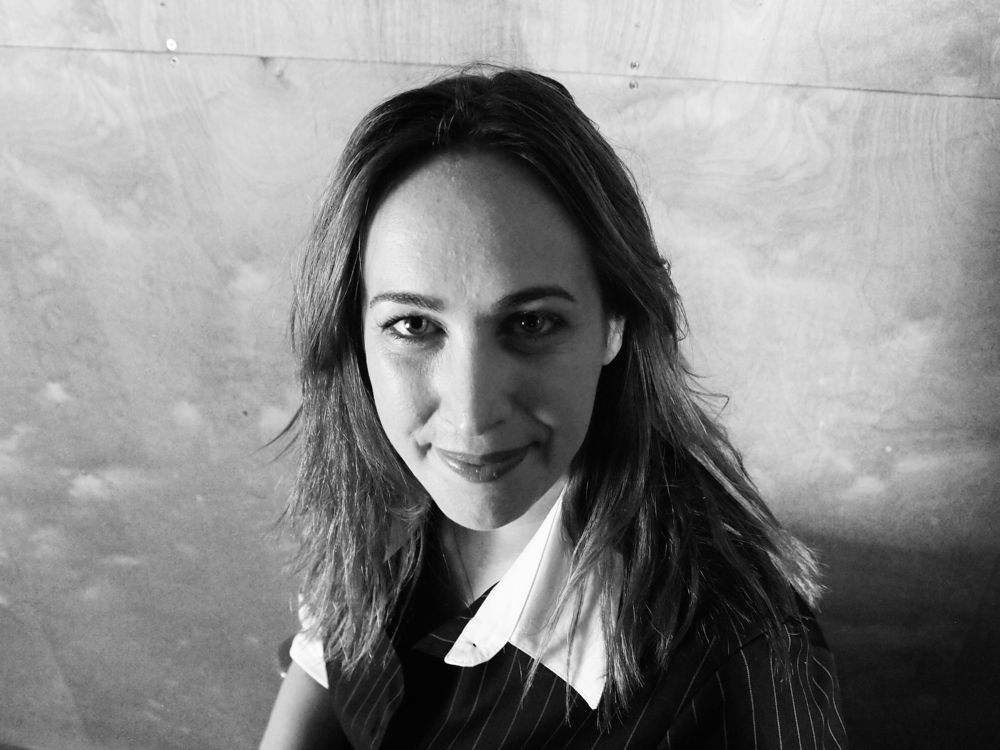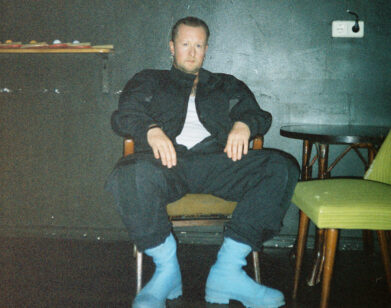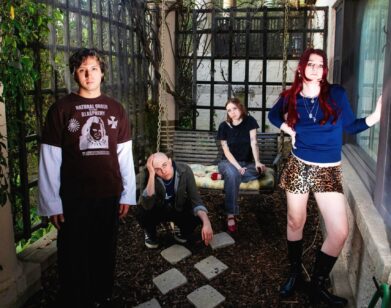Running Down A Dream: Adria Petty Goes to the VMAs

ABOVE: ADRIA PETTY. PHOTO COURTESY OF ALAN BIBBY AND JACK DISHEL.
“I’m pretty committed to being a filmmaker because it incorporates everything I love: music, art direction, story, and you know—everything,” says Adria Petty.
Versatile is one way to describe the filmmaker and director; tonight, she is nominated for three MTV Video Music Awards for her co-directing efforts on videos for Beyoncé’s “Countdown,” Coldplay and Rihanna‘s “Princess of China,” and her pal Regina Spektor’s “All the Row Boats.” To say she’s had a busy year is a gross understatement. The daughter of singer Tom Petty, Adria switches from shooting documentaries (Paris, Not France and Spektor’s Live In London), commercials, and personal film projects (NU-6), as well as epic kung fu and Audrey Hepburn-inspired music videos.
Interview caught up with Adria in LA before the big night to talk about Beyoncé, growing up in Encino, California, and how the Kardashians learned much of their celeb wrangling self-promotion skills from Paris Hilton.
ANGELA LEDGERWOOD: Did you ever want to be a musician?
ADRIA PETTY: Absolutely! I always wanted to be a musician, 100 percent, my whole life. I went to school, I did music theory, I did voice training and piano lessons, and while I was a decent musician, it didn’t seem like enough for me. I felt like I wanted to make more than just music.
LEDGERWOOD: What’s your process in making a music video? Do you listen to the song, then brainstorm and come up with a story?
PETTY: My process is pretty much a formula of talking to the artist. I’ve never made a video where I didn’t talk to the artist before I wrote the treatment. Basically, I enter into it knowing we are collaborators. I have a responsibility to depict the artist in a way that suits them, and feels comfortable with how they want to present their music. From there I usually try to tell a story visually that complements the music, that lets the music be the hero element of the project. I just try to do something that feels sincere and creative and a little bit home-brewed so it doesn’t feel too plastic or phony. Musicians ultimately are who they are, they aren’t actors, so you have a responsibility to protect them. With Beyoncé, I’m so lucky because I get to speak with her on the phone and develop an idea and I’ve worked with her four times so far. I’ve done two commercials with her that evolved in a similar way. She has very little time to do preparation and I totally acknowledge that she can only do so much until she’s on set.
LEDGERWOOD: For the Coldplay video featuring Rihanna, “Princess of China,” you collaborated with Alan Bibby; how did that work?
PETTY: This job required two directors, because it was done in a very short period of time. The kung fu concept was more Alan’s background; he knew the entire genre inside and out, whereas I was fascinated with certain aspects of it visually. I felt a responsibility to the people that love that genre so much to loop someone in who would protect it and the pressure was diffused between two people.
LEDGERWOOD: The videos look like they could have taken weeks to film…
PETTY: “Princess of China” was shot in one day, except for the one walking shot of Chris that was shot the next day before he took off on a plane. One long day. [laughs]
LEDGERWOOD: I assumed all those hands coming out from behind Rihanna were computer generated, but I saw that they were all real ladies.
PETTY: Yeah, it was a miracle, we only had three days in LA and we found a troupe of dancers and this lady called Pe Pe, she called herself “Pepper The Hot Stepper” [laughs]. There was a lot of them calling bullshit on us using different Asian influences, but the truth is when you’re making a music video you don’t want to try and make The Last Emperor, [laughs] you just want to make something beautiful.
LEDGERWOOD: What happens if an artist has an idea that you think is completely wacky—how you deal with that?
PETTY: I try to bring them into the logistics of filmmaking, and I try to preserve whatever’s of value and achievable in their idea. If it’s something I can’t achieve, I tell them straight. You want to make sure that the artist really loves the idea and is committed to it, otherwise they’re not going to feel great when they’re up there miming it. I’ve probably learned that from my father, who made a lot of music videos when I was growing up. I think musicians are perfect at knowing how to get the best out of other musicians. I can really relate to that communion.
LEDGERWOOD: Did you spend a lot of time on those sets as a kid?
PETTY: I actually never went to any of those sets. [laughs] Someone asked me recently, “Did your dad turn you on to a lot of visual art when you were growing up?” And I said no, absolutely not. [laughs] We lived in Encino, and we didn’t have a lot of stimulus that was cultural or artistic visually; musically, we were very inspired. But I think most of that came from going to art school and film school and being exposed to so much art in Manhattan as a young person.
LEDGERWOOD: You make documentaries as well; did your experience making the Paris Hilton documentary Paris, Not France change your views on the cult of celebrity? You have also been exposed to it because of your dad your whole life…
PETTY: I didn’t anticipate getting roped into that project with Paris Hilton to the extent that I did. When I met Paris, she was on the cover of Vanity Fair and she’d just had her sex tape released everywhere. I don’t even know if YouTube existed at the level it does now. Paris had a great instinct for how to get attention and she knew how to use new media. She was sort of the beta test of how much someone could create a firestorm with all of the new media outlets and the new levels of communication, and paparazzi, and press. She had an inciting incident with the sex tape that galvanized everybody’s eyes on her and she kept capitalizing on it. She was savvy enough to have a really nice handbag that she was paid to promote. She knew to wear that one in front of the paparazzi and then change it once she got in the car, little things like that. She was obviously in the know to a level that even the rest of the world wasn’t aware of.
When I started the project, she was the counter opposite to everything I valued, and then as I got deeper into it I realized she was sort of on the cutting edge of everything that was about to happen; the way young people were communicating, and connecting, and starting to see the world. She showed me Perez Hilton’s website. She knew about how people were going to get their information for better or for worse. Throughout the process, she kind of earned my respect as somewhat of a mad genius in regard to creating celebrity culture. I think that her friend, Kim Kardashian, who I actually shot quite a bit of (it never made it into the film) was studying this with very avid eyes. I think Paris absolutely educated that family on how to navigate those waters and get attention.
LEDGERWOOD: So they were all friends, I didn’t know that.
PETTY: They were very close friends, and Kim was just kind of hanging out with her, I wouldn’t say sidekick, but she was a pal of hers who was sort of in the shadows at that time.
LEDGERWOOD: Were your parents protective of you in that way?
PETTY: I think my dad saw himself as a family man, somebody that had a child the year he got a record deal and moved out to California with 12-plus dependents. He was 22 and felt a great deal of pressure to support all of the people that believed in him. What he was doing was based on a work ethic, and a focus on quality. I wasn’t given the sense that celebrity, or fame, or any of that, was something to be impressed by, or to seek out. It was always impressed upon me that making something well crafted, something respected, was the most important thing to do with your life, and I’ve tried to do that where I can in my field.
LEDGERWOOD: I read that your dad met Elvis as young boy and was inspired to become a musician.
PETTY: Yeah, my dad and I had that conversation the other night, and he admitted that he knew he loved music way before he met Elvis. As a very young person, he was almost too obsessed with records and 45s. It’s really adorable to hear him talk about how he would sneak into his neighbors’ house and steal 45s and play them, and then sneak them back before anyone noticed. [laughs] He was very determined to get his hands on music.
LEDGERWOOD: It feels like you and Regina are kindred spirits. Can you tell us about “All the Row Boats,” another video you’ve been nominated for?
PETTY: “All The Row Boats” was about getting us all together in a black box and being able to collaborate in total comfort, no attachment to a label, nothing fancy, really no budget, and just create together and just connect with her song. I don’t mean to sound cheesy, but I feel like she is a gift from god to me as an artist. We’re so close and constantly motivating and pushing each other. Even when we made videos for two dollars rubbed together in my driveway, or in my little studio in Venice shooting through a jar of water or something, we made videos that hopefully let you in on our delight. She’s helped shape who I am as an artist.
THE MTV MUSIC VIDEO AWARDS AIR TONIGHT, SEPTEMBER 6, ON MTV.






